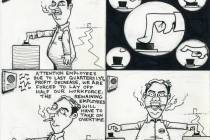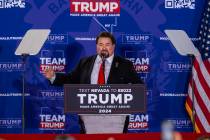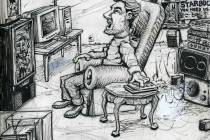The McWeiner controversy
WASHINGTON — Over two decades of covering politicians’ scandals, I’ve often been asked a version of this question: What makes them do such stupid things?
Based on my extensive experience, I respond with a version of this answer: I don’t know.
But I do have theories. And that brings me to last week’s McWeiner controversy.
Most news accounts treated these as two separate scandals: Anthony Weiner, the disgraced Democratic congressman and would-be mayor of New York, had been exposed again as a digital flasher, sending “selfie” pictures of his privates to women. Bob McDonnell, the Republican governor of Virginia, was found to be taking gifts and loans from a businessman McDonnell had helped.
Their offenses — particularly their responses upon being caught — are much the same.
By coincidence, both men found themselves apologizing for their misdeeds on the same day, July 23. McDonnell’s was cowardly, done via Twitter while he was out of the country; Weiner’s was handled in yet another bizarre news conference. But both were reluctant, their statements less expressions of contrition than naked efforts to make the problems go away. These were the apologies of narcissists.
“I want you to know that I broke no laws,” McDonnell wrote in a statement expressing regret not for the gifts he took but for “the embarrassment” — which occurred when he was found out.
Weiner, though acknowledging his misbehavior, quickly pivoted to blaming others. “With 49 days left until primary day, perhaps I’m surprised that more things didn’t come out sooner,” he said. “This was a very public thing that we had happen to us,” he added, as if somebody else had forced him to send out photos of his genitals.
Their offenses are similarly pointless: Weiner threw away a promising career by exchanging smut with women he claims he never met. McDonnell, once mentioned as a possible presidential candidate, undid his reputation by accepting sums — a $6,500 Rolex, a $15,000 splurge at Bergdorf Goodman — that were trivial compared to those he could have earned when he left office.
Both men seem to have the condition that afflicts so many officeholders who get into trouble, from Clinton to Foley to Sanford to Spitzer: a sense of invincibility, and a belief that the usual rules don’t apply to them. They take ever bigger risks, as if it is a form of thrill-seeking, or they can no longer gauge risk.
Weiner’s was particularly flamboyant: On the day in 2010 when the House voted to approve Obamacare, and Republican lawmakers stood on the House balcony riling a tea party crowd below, Weiner showed up and taunted the gathering. “I feel like Mussolini now!” he said.
The narcissistic strain is common, and predates the rise to power. It takes a certain personality to believe that he, or she, is meant to lead. This is reinforced once in power by sycophantic staffers. The problem has become worse as redistricting leaves more lawmakers with safe seats, but the phenomenon is not Washington’s alone: McDonnell honed his invincibility in Richmond, and Weiner continued his behavior after resigning his House seat.
Whatever the origins, last week’s McWeiner apologies show what happens when the lawmaker’s innate grandiosity is nurtured. From McDonnell’s Twitter account came this message: “Gov Bob McDonnell releases important statement: Repaid loans, apologized,” as if checking boxes. The tweet also cited a “report” — issued by one of McDonnell’s lawyers — saying the company of the businessman who sponsored McDonnell received “no benefit.”
It later emerged that McDonnell was in Kuwait and Afghanistan when the perfunctory apologizing was occurring. He gave a satellite interview to Washington’s NBC4, saying with a smile that “I’m not going anywhere. I love this job.”
Likewise, when Weiner was asked at his news conference what he would say to “those people who want you to drop out of the race,” he shot back: “I’m sure many of my opponents would like me to drop out of the race.”
McDonnell padded his brief statement with a proclamation that “Virginia has never been stronger and I plan to focus on creating even more jobs.”
Weiner, in turn, said the new revelations — that he continued sexting even after his wife told People magazine last summer that he had reformed himself — doesn’t change “the fundamentals of my feelings here, and that is that I want to bring my vision to the people of the city of New York. I hope they’re willing to still continue to give me a second chance.”
Or a third chance. Whatever the number, the McWeiners will always think they deserve it.
Follow Dana Milbank on Twitter, @Milbank.
(c) 2013, Washington Post Writers Group
















